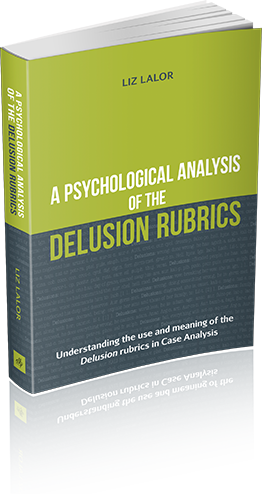Renowned homeopathic counsellor and author, Liz Lalor lectures and writes on the symbiotic relationship between mental and emotional disturbance, and physical pathology. A Psychological Analysis of the Delusion Rubrics is an extensive Materia medica adaption of her second book Homeopathic Psychiatry.
In its original form, Homeopathic Psychiatry combined homeopathic rubric-repertorisation and traditional counselling techniques to create an invaluable case taking manual. A Psychological Analysis of the Delusion Rubrics expands on this with a revised introduction, new Denial chapter and extended Materia medica to address the narrative behind the physical pathology.
Homeopathic analysis of disease concentrates on unearthing the peculiar within the patient’s story of their life. In this fresh adaption, Lalor focuses attention on the denial process of the patient as they negotiate illness. The peculiar in the patient’s narrative is the essence of the understanding of the use and meaning of the Delusion rubrics in case analysis.
This book is an invaluable guide – both for homeopaths and students of homeopathy – to fully understand these previously misunderstood and underutilized rubrics in our repertory.
The Mind section of the homoeopathic repertory contains the Delusion rubrics. These are the rubrics which are applicable in the case analysis if the patient displays psychological delusions. The rubrics in the repertory which resonate with a conflict matching the psychological delusions can only be Delusion rubrics because these rubrics indicate an exaggerated reactive thought process. A Delusion rubric applies to the case analysis when a patient misrepresents and misinterprets reality in a disproportionate or hysterical way consistent with the psychiatric definition of a psychological delusion.
In the application of a Delusion rubric (in case-taking) the homoeopath seeks to understand why the patient has set up the delusional state and why they need to maintain the misrepresentation, or hysterical reactivity to everyday life.
This understanding in homoeopathic case analysis is an integral part of case-taking which will indicate the simillimum in the case. In a psychiatric consultation, the psychoanalyst also seeks to understand the need behind why the patient has created the psychological delusion to avoid the reality of everyday life. In both modalities – psychiatry and homoeopathy – the psychological delusion is recognized as being injurious to health and recognized as the first indicator of potential illness across all levels – the emotional, mental and physical. That is where the similarity between the two modalities end.
As homoeopaths we need to find ‘why and how’ our patients cannot face everyday reality after trauma, and exactly ‘why and how’ they have created a story around and over their trauma to protect even their own memory from ever knowing it was there. Often unravelling trauma is like peeling back layer upon layer of bubble wrap which our patients have wrapped around themselves to buffer any future blows from life. The difficulty in that sort of solution is of course that the patient themselves discovers not only have they protected themselves from future bruising with the layers of bubble wrap; they have also covered up their own emotional feeling to life itself.
Furthermore, the memory of the trauma is under so many layers of bubble wrap that the patient has lost their memory of what the trauma looked like originally; hence the memory grows out of proportion to reality. That is the start of the delusion.
When we hide trauma it is like hiding a secret, the hold it has on us grows out of proportion to reality, and we recreate a story around that trauma to protect it like bubble wrap. The difficulty is that the story is rewritten and misinterpreted and is no longer a simple truth it is an exaggerated or hysterical disproportionate truth. That is the start of the delusion in homoeopathy known as ‘never-well-since-event’.
Recognizing the psychological stages will assist in finding the simillimum because it allows you to narrow down the remedies being considered in case-taking to the remedies listed in those particular rubric-categories.
